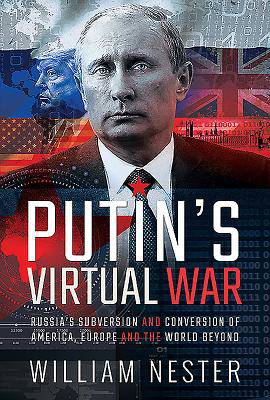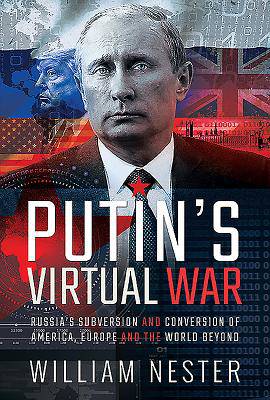
- Afhalen na 1 uur in een winkel met voorraad
- Gratis thuislevering in België vanaf € 30
- Ruim aanbod met 7 miljoen producten
- Afhalen na 1 uur in een winkel met voorraad
- Gratis thuislevering in België vanaf € 30
- Ruim aanbod met 7 miljoen producten
Zoeken
Putin's Virtual War
Russia's Subversion and Conversion of America, Europe and the World Beyond
William Nester
Hardcover | Engels
€ 34,95
+ 69 punten
Omschrijving
Analyzes Russia's historical position in the world and the rise and fall of the Soviet Union by looking at Putin's background and his rise to power.
With his elfin poker face, receding short golden hair, diminutive but muscular body, and stiff clipped gait, Vladimir Putin is among the world's most recognizable leaders. He has tightly ruled Russia since 31 December 1999, and will firmly assert power from the Kremlin for the foreseeable future. Many fear and loath him for his brutality, for ordering opponents imprisoned on trumped up charges and even murdered. Yet most Russians adore him for rebuilding the economy, state authority, and national pride.
What drives Putin? Much more than greed for money and power animates him. He is a zealous nationalist deadset to make Russia great again. He mourns the Soviet Union's breakup as 'the greatest political catastrophe of the twentieth century.' Putin's nostalgia is understandable. The Russian empire peaked in territory, population, military power, and prestige when it was called the Soviet Union.
Putin has mastered the art of power. Depending on what is at stake, that involves the deft wielding of appropriate or 'smart' ingredients of 'hard' physical power like armored divisions, multinational corporations, and assassins, and 'soft' psychological power like diplomats, honey-traps, cyber-trolls, and fake news factories to defeat threats and seize opportunities. Russian hackers penetrated the Democratic National Committee (DNC) and Hillary Clinton's campaign organization, extracted tens of thousands of potentially embarrassing emails, and posted them on WikiLeaks.
As the Kremlin's latest ruler, Putin, like most of his predecessors, is as realistic as he is ruthless. He knows the limits of Russian hard and soft power while constantly trying to expand them. He is doing whatever he can to advance Russian national interests as he interprets them. In Putin's mind, Russia can rise only as far as the West can fall. And on multiple fronts he is methodically advancing to those ends. Putin's Virtual War reveals just how and why he does so, and the dire consequences for America, Europe, and the world beyond.
With his elfin poker face, receding short golden hair, diminutive but muscular body, and stiff clipped gait, Vladimir Putin is among the world's most recognizable leaders. He has tightly ruled Russia since 31 December 1999, and will firmly assert power from the Kremlin for the foreseeable future. Many fear and loath him for his brutality, for ordering opponents imprisoned on trumped up charges and even murdered. Yet most Russians adore him for rebuilding the economy, state authority, and national pride.
What drives Putin? Much more than greed for money and power animates him. He is a zealous nationalist deadset to make Russia great again. He mourns the Soviet Union's breakup as 'the greatest political catastrophe of the twentieth century.' Putin's nostalgia is understandable. The Russian empire peaked in territory, population, military power, and prestige when it was called the Soviet Union.
Putin has mastered the art of power. Depending on what is at stake, that involves the deft wielding of appropriate or 'smart' ingredients of 'hard' physical power like armored divisions, multinational corporations, and assassins, and 'soft' psychological power like diplomats, honey-traps, cyber-trolls, and fake news factories to defeat threats and seize opportunities. Russian hackers penetrated the Democratic National Committee (DNC) and Hillary Clinton's campaign organization, extracted tens of thousands of potentially embarrassing emails, and posted them on WikiLeaks.
As the Kremlin's latest ruler, Putin, like most of his predecessors, is as realistic as he is ruthless. He knows the limits of Russian hard and soft power while constantly trying to expand them. He is doing whatever he can to advance Russian national interests as he interprets them. In Putin's mind, Russia can rise only as far as the West can fall. And on multiple fronts he is methodically advancing to those ends. Putin's Virtual War reveals just how and why he does so, and the dire consequences for America, Europe, and the world beyond.
Specificaties
Betrokkenen
- Auteur(s):
- Uitgeverij:
Inhoud
- Aantal bladzijden:
- 320
- Taal:
- Engels
Eigenschappen
- Productcode (EAN):
- 9781526771186
- Verschijningsdatum:
- 13/02/2020
- Uitvoering:
- Hardcover
- Formaat:
- Genaaid
- Afmetingen:
- 163 mm x 234 mm
- Gewicht:
- 680 g

Alleen bij Standaard Boekhandel
+ 69 punten op je klantenkaart van Standaard Boekhandel
Beoordelingen
We publiceren alleen reviews die voldoen aan de voorwaarden voor reviews. Bekijk onze voorwaarden voor reviews.








